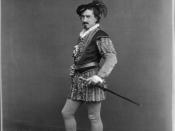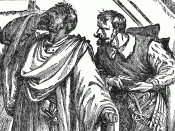Introduction:Indeed, race and racial perspectives play a pivotal role in Shakespeare's unique tragedy Othello. Throughout the play, both the characters and the reader have the sense of the "otherness," to which differences of origin, ethnicity, color and even religion (as in the case of the Turks) greatly contributes, and which incites the characters into dominating each other, causing the marginalization of, and infliction upon certain characters in the play.
The Turks:Despite the fact that the Turks do not exist as characters in Othello, they are incessantly referred to throughout the play. Such references are indeed significant, for they contribute to the growing aforementioned sense of "otherness," and reflect the characters' explicit hostility as well as implicit insecurity towards the Muslim Turks. Earlier in the play, the reader learns of the wars against the Turks and of the characters anxiety over and enthusiasm for their imminent battle with the Turks at Cyprus.
Many offensive references to the Turks abound in the play, mainly calling them pagans and heathen. Praising himself as opposed to Cassio, Iago takes pride in his courage in wars against Christians and Turks, to whom he refers as "heathen": "And I, of whom his eyes had seen the proof/ At Rhodes, at Cyprus and on other grounds,/ Christian and heathen, must be be-leed and calmed/ By debitor and creditor." To the characters, the word Turk is an insult; to assure he is telling the truth, Iago says: "Nay, it is true, or else I am a Turk." Also, scolding Montano and Cassio for their fight, Othello says: "Are we turned Turks? and to ourselves do that/ Which heaven hath forbid the Ottomites?"The Christian Moor, Othello:Shakespeare first introduces Othello to the reader on racial basis. Othello is at first referred to as "his Moorship" and "the...
![From the Library of Congress: TITLE: Thos. W. Keene. Othello CALL NUMBER: POS - TH - 1884 .O7, no. 1 (C size) [P&P] REPRODUCTION NUMBER: LC-USZC6-58 (color film copy transparency) RIGHTS INFORMATION: No known restrictions on publication. MEDIUM: 1 print (](https://s.writework.com/uploads/9/94760/library-congress-title-thos-w-keene-othello-call-number-pos-thumb.jpg)


Race and Racial Perspectives in Shakespeare's Othello
I think this was well written, I agreed with the conclusion too...
0 out of 0 people found this comment useful.